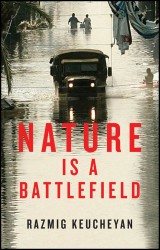Details

Nature is a Battlefield
Towards a Political Ecology1. Aufl.
|
21,99 € |
|
| Verlag: | Wiley |
| Format: | |
| Veröffentl.: | 23.05.2017 |
| ISBN/EAN: | 9781509503797 |
| Sprache: | englisch |
| Anzahl Seiten: | 220 |
DRM-geschütztes eBook, Sie benötigen z.B. Adobe Digital Editions und eine Adobe ID zum Lesen.
Beschreibungen
<p>In the midst of the current ecological crisis, there is often lofty talk of the need for humanity to ‘overcome its divisions’ and work together to tackle the big challenges of our time. But as this new book by Razmig Keucheyan shows, the real picture is very different. Just take the case of the siting of toxic waste landfills in the United States: if you want to know where waste is most likely to be dumped, ask yourself where Blacks, Hispanics, Native Americans and other racial minorities live and where the poorest neighbourhoods are. This kind of ‘environmental racism’ is by no means restricted to the United States: it is very much a global phenomenon.</p> <p>Keucheyan show how the capitalist response to the crisis has been marked by a massive expansion in ‘environmental finance’. From ‘carbon markets’ to ‘pollution permits’, ‘climate derivatives’ and ‘catastrophe bonds’, we are seeing a proliferation of nature-related financial products. Instead of tackling the root of the problem, the neoliberal strategy seeks to profit from environmental risks.</p> <p>Moreover, with the rise in natural disasters, resource scarcity, food crises, the destabilization of the poles and oceans and the prospect of tens of millions of ‘climate refugees’, Western powers are increasingly adopting a military response to ecological problems. The Cold War is over: welcome to the ‘green wars’. From New Orleans to the Siachen glacier via the Arctic floes, Keucheyan explores the landmark sites of this new ‘climate geostrategy’.</p> <p>Through a sharp critique of the way capitalism responds to environmental disaster, this innovative book provides a fresh perspective on some of the most critical issues confronting our societies today.</p>
Contents<br /><br /> Introduction<br /><br /> Chapter One: Environmental racism<br /> A philosophical event<br /> The colour of ecology<br /> Hurricane Katrina as a ?metaphor? for environmental racism<br /> The spatiality of racism<br /> Lead poisoning and class struggle<br /> Postcolonialism and environmental crisis: the conflict in Darfur<br /> Ecological inequalities: A Marxist approach<br /> The archaeology of environmental racism<br /> Race and reforestation<br /> Purifying nature?<br /> ? and naturalising race<br /> Exporting the environment<br /> The coming political ecology<br /> Conclusion<br /><br /> Chapter Two: Financialising nature: Insuring climatic risks<br /> Financial markets ?plugged into? nature<br /> Principles of insurance<br /> New risks?<br /> The ontology of catastrophe<br /> Risk and postmodernity<br /> Cat (catastrophe) bonds <br /> Nature as ?real abstraction?<br /> Carbon markets and unequal development<br /> Constructing profitable markets<br /> A ?multi-cat? bond in Mexico<br /> Ecological crisis and the fiscal crisis of the state<br /> A derivative nature<br /> Nature as accumulation strategy<br /> Conclusion<br /><br /> Chapter Three: Green wars, or the militarisation of ecology<br /> A doctrine emerges<br /> A benevolent dictatorship<br /> Chaos specialists<br /> Terrorism and climate change<br /> The new military ecology<br /> Conservation and counter-insurgency<br /> Econationalism<br /> Agent Orange<br /> From the Cold War to green wars<br /> The end of conventional wars?<br /> Double movement<br /> Climate refugees<br /> Nuclear deterrence and ecological crisis<br /> War and biofuels<br /> The oceans destabilised<br /> The scramble for the Arctic<br /> The North Pole and globalisation<br /> Commodifying the thaw <br /> The speed of the circulation of capital<br /> Conclusion<br /><br /> Conclusion: Game over?<br /><br /> Notes
"We now have an eloquent new perspective on the crises of our time, illuminating the multiple links and intricate relationships among inequality/racism/globalization on the one hand, and the capitalist, financial, and military elites that drive them, on the other, all of this mediated by their multiple connections to the state and nature. <i>Nature is a Battlefield </i>is essential reading for understanding the next fifty years."<br /><b> John Foran, University of California, Santa Barbara
<p>Razmig Keucheyan is an assistant professor in sociology at the University of Paris-Sorbonne. He is the author of Le constructivisme. Des origines à nos jours and has recently edited a selection from Antonio Gramsci’s Prison Notebooks in French. He is also the author of Nature is a Battlefield (Polity Books, 2016) and The Left Hemisphere: Mapping Critical Theory Today (Verso 2013).</p>

















